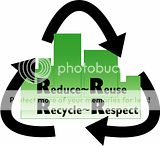What is Your Carbon Footprint?
 I came across an interseting article by Linda K. Schneider while reading Parks & Recreation magazine.
I came across an interseting article by Linda K. Schneider while reading Parks & Recreation magazine.
What is Your Carbon Footprint?
How much land do people require to support themselves?
This is called a Carbon Footprint. Everyone impacts the earth with our daily routines, just by being alive. How much we impact the earth depends on our habits and rate of consumption of natural resources: water, wood, coal, gas and oil.
According to http://www.carbonfootprint.com/; Carbon Footprint is a measure of the impact human activities have on the enviroment in terms of the amount of greenhouse gases produced, measured in units of carbon minoxide. At this web site, you can learn how to calculate, reduce and offset your carbon footprint.
We are a culture that turn natural resources into waste faster than any other society on the planet. The carbon footprint is a rough measure of how much productive land any person uses to support their lifestyle. The average Americans carbon footprint has been calculated at 25 acres--that's five times the average Asian or African. If the world's population lived like Americans live, FIVE planet Earths would be needed for survival!!
Small changes can affect someone's footprint: reduce car trips in half by combining errands, go for a walk instead of a drive.
Everyone contributes to this problem daily, BUT everyone can contribute to the solution daily. The goal is to reduce the daily amount of resources used. This problem is quite large, but we can start by thinking small and close to home.
Plant trees. Trees are needed for cleaner air and they give off oxygen. Tress absorb the carbon dioxide that human activites emit. Water is our most precious resource, we can't live without it. Be more aware of the amount of water used for each activity. Energy is used to heat water. Use less hot water, take shorter, cooler showers and baths. Purchase low flow toliets and showerheads. Purchase newer model appliances that are more efficient. Wash your clothes in cold water.
Recycling is another way to reverse the impact on the enviroment. Recycle as many products as you can. Purchase products made with recycled materials.
To learn more about your carbon footprint, find out how you impact the planet, to calculate the size of your footprint, visit the following web sites:
http://www.carbonfootprint.com/
http://www.carbonneutral.com/
http://www.myfootprint.org/
http://www.panda.org/




 Stumble It!
Stumble It!


















No comments:
Post a Comment